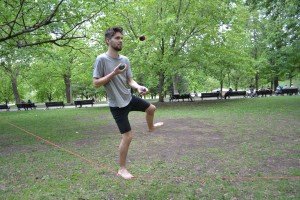Have you ever been accosted by a street or door-knocking evangelist? This question may conjure visions of striding teams of tall, clean-cut young men sporting name tags and earnest faces. I have one friend who claims to have been visited more than once at home by a Jehova’s Witness, who, after many discussions on scripture, relented and converted (to what, I’m not entirely sure: Anglicanism?). Some may object to such a broad application of the term ‘evangelism’. Others may think the term can apply much more broadly. Do Hari Krishnas count? What about PETA, Amnesty International, the Red Cross?
I’ve always been curious about people who do this sort of work. Stopping people on the street for a bit of conversation holds a potential for unscripted exchange and unforeseen outcomes that is both appealing and uncomfortable. How could I propose myself for a fruitful exchange? How would I deal with rejection? And even if people do stop a while to answer questions and exchange perspectives, the likelihood of never seeing or hearing from them again is very real–how should I measure success?
This summer I’ve decided, with the company of a friend, to put myself out there. For Jesus? Well, yes–but not in the conventional way, and I’ll tell you why. It’s no secret that Quebec’s ‘Quiet Revolution’ appears to have all but discarded religion as a guiding force and binding social norm in the province. But is this not a precious grace? Space has been and continues to be created for fresh, budding, exciting conversations on faith, spirituality–or, more simply put, ways in which people seek to ‘fill the void’. The harvest is plentiful, but the laborers are few…
Formal civil-political efforts such as the Bouchard-Taylor Commission on ‘Reasonable Accommodation’ have played a role in hearing and identifying grievances and possible areas of cooperation among individuals and their communities. Interfaith events and university conferences also continue to nourish a certain level of discourse on these topics. Yet, none is peculiarly driven by the unparalleled magic of a surprise encounter; the immediacy of an improvised connection; the chance for the average person to offer consent, look up to the sky, down to the earth, pause, reflect, seize the moment…
I see these ‘urban faith encounters’ in Montreal as love letters from me to residents of the city, because what they think, feel, hope, and earnestly desire deserve opportunity for expression, even when some or much of that expression, for whatever reason, does not find voice in a formalized setting. Yet, these encounters are also love letters I receive myself as an inhabitant of this city, as I am transformed by the practice of asking and listening to what people around me perceive as spirit, calling, life purpose, truth, and anything else that touches them deeply.

